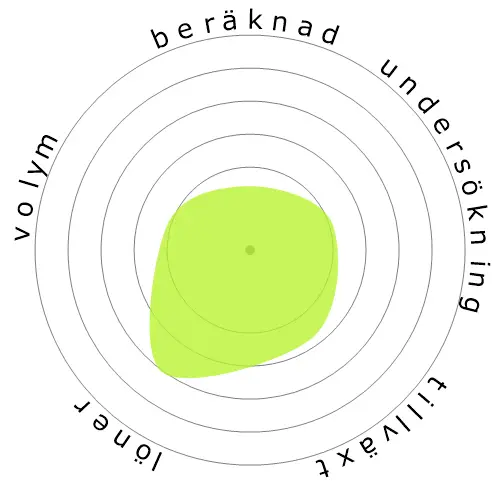Tekniska författare




Personer tittade också på
Beräknad automatiseringsrisk
Omedelbar risk (81-100%): Yrken på denna nivå har en extremt hög sannolikhet att automatiseras inom den närmaste framtiden. Dessa jobb består huvudsakligen av repetitiva, förutsägbara uppgifter med litet behov av mänskligt omdöme.
Mer information om vad detta betyg är, och hur det beräknas finns tillgängligt här.
Användarundersökning
Våra besökare har röstat att de är osäkra på om detta yrke kommer att automatiseras. Emellertid tyder den automatiseringsrisknivå vi har genererat på en mycket högre chans för automatisering: 94% chans för automatisering.
Vad tror du är risken med automatisering?
Vad är sannolikheten att Tekniska författare kommer att ersättas av robotar eller artificiell intelligens inom de närmaste 20 åren?
Känsla
Följande graf inkluderas där det finns en betydande mängd röster för att ge meningsfull data. Dessa visuella representationer visar användaromröstningsresultat över tid och ger en viktig indikation på sentimenttrender.
Känslor över tid (årligen)
Tillväxt
Antalet 'Technical Writers' lediga jobb förväntas att öka med 4,0% till 2033
Total sysselsättning och uppskattade jobböppningar
Uppdaterade prognoser beräknas 09-2025.
Löner
I 2023 var den medianårliga lönen för 'Technical Writers' 80 050 $, eller 38 $ per timme.
'Technical Writers' betalades 66,6% högre än den nationella medianlönen, som låg på 48 060 $
Löner över tid
Volym
Från och med 2023 var det 47 970 personer anställda som 'Technical Writers' inom USA.
Detta representerar cirka < 0,001% av den anställda arbetskraften i hela landet
Sagt på ett annat sätt, runt 1 av 3 tusen personer är anställda som 'Technical Writers'.
Arbetsbeskrivning
Skriv tekniska material, såsom utrustningsmanualer, bilagor eller instruktioner för drift och underhåll. Kan hjälpa till med layoutarbete.
SOC Code: 27-3042.00


Kommentarer
Leave a comment
The main challenge for an AI is not the technical writing. It is actually making sense of the source material. This will be the main job of technical writers: Explaining to the AI what it needs to write. Technical writers will increasingly be busy with post-editing AI written texts, which will be a very mind numbing task. It will also require fewer people and warrant lower pay.
If you want to know the future of technical writing, look at what has happened to technical translation. If you are a technical writer, you are headed the same way. You will operate AI tools and check the results for lousy pay because you are not actually doing the brain work. Get into nursing or open a funeral home. People will always get sick and die, that's a future-proof occupation.
Curating and organizing the information to feed to the AI, and checking their output for accuracy, may be one of the few jobs left to tech writers.
As technical writers we understand complex systems (as well as the engineer's gibberish that often comes with it) and are able to translate this into a form that is easily understood by the respective user groups, i.e. operators or maintenance personnel.
In my opinion AI nowadays can provide draft text to the technical writers. But it takes a human to process that into understandable content, because only a human can know what is necessary for others to profit from precise instructions and related warnings. Also when it comes to jurisdiction.
Who will be held accountable for injury or death caused by automated AI that simply pretends to be human-like but has otherwise no conscience? I mean, an AI can tell you that a stove is hot, but does this mean it really knows the consequences of touching it?
Some learned it the hard way, I doubt an AI can.
I don’t see this role being completely automated in 10 years.
More importantly, why would anyone pay for a professional to do it?
We are already implementing automated structured reuse on a large scale. People should not underestimate the potential of computational linguistics when combined with machine learning and a knowledge graph-rich future.
Although intelligent content (structured content with human-declared intent) cannot be automated yet, we are already auto-classifying content with additional semantic metadata (taxonomies). AI/ML will continue to assist and eventually replace a significant portion of low-level content development, which will elevate the writer's role to that of an information architect/designer.
Object-oriented content will then become a service called Content-as-a-Service (CaaS), much like an electrical distribution grid.
In TechComm and MarComm, we have been evolving towards this model for many years.
I cannot fathom how AI would somehow be able to do all the things that are required to be done in order to complete a technical writing piece.
AI has already taken over the writing niche . . . people no longer need education to write, software helps them do it. That is all AI could ever do for a writer.
Lämna ett svar om detta yrke